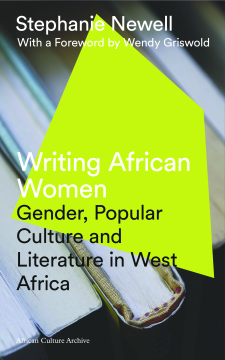
Additional Information
Book Details
Abstract
How does our understanding of Africa shift when we begin from the perspective of women? What can the African perspective offer theories of culture and of gender difference?
This work, as unique and insightful today as when it was first published, brings together a wide variety of African academics and other researchers to explore the links between literature, popular culture and theories of gender. Beginning with a ground-breaking overview of African gender theory, the book goes on to analyse women's writing, uncovering the ways different writers have approached issues of female creativity and colonial history, as well as the ways in which they have subverted popular stereotypes around African women. The contributors also explore the related gender dynamics of mask performance and oral story-telling.
This major analysis of gender in popular and postcolonial cultural production remains essential reading for students and academics in women's studies, cultural studies and literature.
‘Clear, informed thinking about the gendered nexus of culture and power is needed more than ever. The new publication of Newell’s collection is an event to be applauded, and its contents to be pondered.’
Wendy Griswold, from the Foreword
Stephanie Newell is a professor of English at the Yale University, specialising in West African literature. Her other books include The Power to Name: A History of Anonymity in Colonial West Africa (2013) and The Forger’s Tale: The Search for Odeziaku (2006).
Wendy Griswold is the Bergen Evans Professor of Humanities at Northwestern University. Her books include Cultures and Societies in a Changing World (new edition 2012) and Bearing Witness: Readers, Writers, and the Novel in Nigeria (2000).
Table of Contents
| Section Title | Page | Action | Price |
|---|---|---|---|
| Cover | Cover | ||
| About the Author | iii | ||
| Title Page | v | ||
| Copyright | vi | ||
| Contents | vii | ||
| Acknowledgements | ix | ||
| Foreword by Wendy Griswold | xi | ||
| Introduction: Writing African Women: Gender, Popular Culture and Literature in West Africa Stephanie Newell\r | 1 | ||
| Part I: Theory and Politics\r | 9 | ||
| 1: Reading Towards a Theorization of African Women's Writing: African Women Writers within Feminist Gynocriticism | 11 | ||
| 2: Masculinity: The Military, Women and Cultural Politics in Nigeria\r | 29 | ||
| 3: Women's Role in Ghana's Social Development\r | 40 | ||
| Part II: Literatures\r | 45 | ||
| 4: A Life on the Women's Page: Treena Kwenta's Diary | 47 | ||
| 5: Recovering Lost Voices: The Short Stories of Mabel Dove-Danquah\r | 67 | ||
| 6: Rewriting Popular Myths of Female Subordination: Selected Stories by Theodora Adimora-Ezeigbo and May Ifeoma Nwoye\r | 81 | ||
| 7: Gender Conflict in Flora Nwapa's Novels\r | 95 | ||
| 8: Culture and Gender Semantics in Flora Nwapa's Poetry\r | 105 | ||
| 9: Behind the Veil in Northern Nigeria: The Writing of Zaynab Alkali and Hauwa Ali\r | 117 | ||
| 10: The Onus of Womanhood: Mariama Bâ and Zaynab Alkali | 126 | ||
| 11: Narrative Technique and the Politics of Gender: Ama Ata Aidoo's Our Sister Killjoy and No Sweetness Here\r | 137 | ||
| Part III: Popular Culture\r | 147 | ||
| 12: Hausa Women as Oral Storytellers in Northern Nigeria\r | 149 | ||
| 13: Gender Politics in West African Mask Performance\r | 157 | ||
| 14: Anatomy of Masculine Power: Three Perspectives on Marriage and Gender in Nigerian Non-fiction\r | 170 | ||
| 15: Gender Tempered Through Metal: Women in Metal-Casting in Benin City, Nigeria\r | 191 | ||
| Index | 198 |
